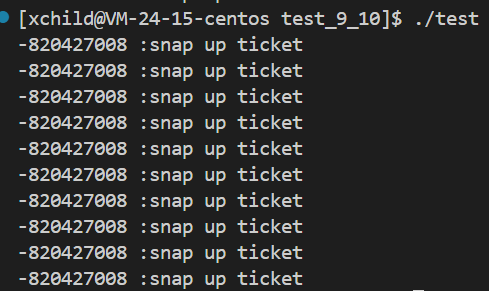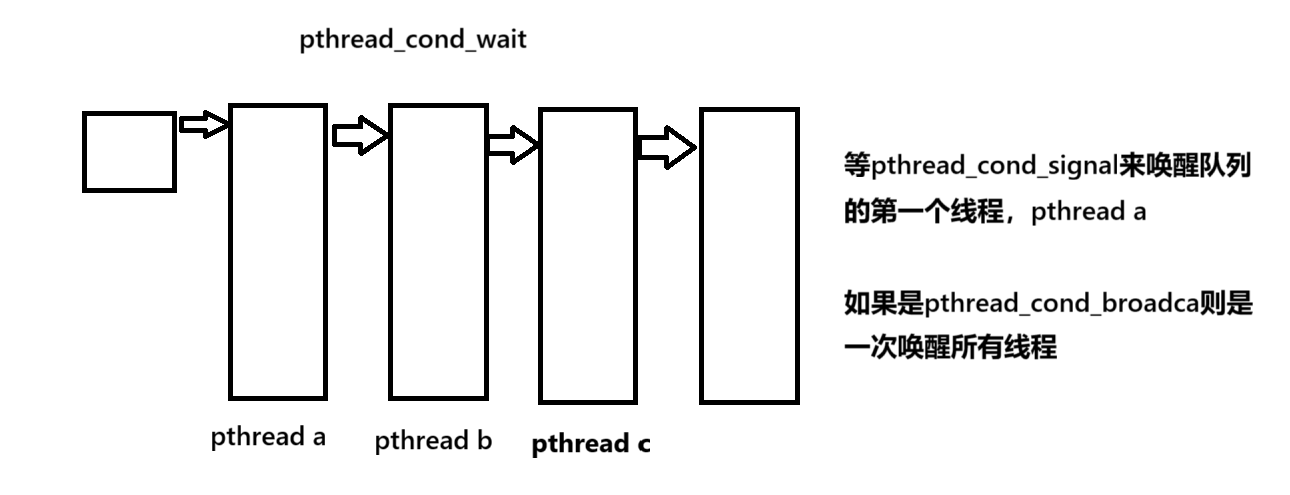线程同步:条件变量实战指南
目录
1.条件变量的概念:
2.条件变量的使用
3.例子
锁有可能导致某一线程独占资源的情况。例如下面写的一个抢票程序,其中一个线程ID为820427008的线程在竞争锁时,频繁且快速的获得了锁,由于调度器的调度时机等因素,始终抢不过这个线程,导致这个线程能够持续获取锁,从而表现出独占资源的现象
#include <pthread.h>
#include <cstdio>#define NUM 5pthread_mutex_t lock = PTHREAD_MUTEX_INITIALIZER;
int ticket = 100;void* get_ticket(void *args)//抢票
{pthread_detach(pthread_self());while(1){pthread_mutex_lock(&lock);if(ticket > 0)ticket--;else{pthread_mutex_unlock(&lock);break;}printf("%d :snap up ticket\n",pthread_self());pthread_mutex_unlock(&lock);}
}int main()
{for(int i = 0;i < NUM; i++){pthread_t pid;pthread_create(&pid,nullptr,get_ticket,nullptr);}pthread_mutex_destroy(&lock);return 0;
}
1.条件变量的概念:
条件变量是线程可用的另一种同步机制。当与互斥量一起使用时,条件变量允许线程以无竞争的方式等待任意条件的发生。
条件本身受互斥量保护的。线程必须首先锁定互斥量才能改变条件的状态。其他线程在锁定互斥量之前不会注意到这种变化,因为必须锁定互斥量才能评估
2.条件变量的使用



- 创建一个pthread_cond_t的数据
- 进行初始化,可以常量PTHREAD_COND_INITIALIZER赋值,也可以使用pthread_cond_init函数对其进行初始化
- 使用pthread_cond_wait函数。传递给pthread_cond_wait函数的互斥量会保护条件。调用者将其锁定的互斥量传递给函数,然后该函数自动将此调用线程方式等待条件的线程列表中,并解锁互斥量。
- 陷入pthread_cond_wait阻塞的函数,等待被pthread_cond_signal或broadcast唤醒
- 程序运行结束后,调用pthread_cond_destroy销毁条件变量
用图解方式解释一下在pthread_cond_wait“睡眠”的线程

注意:如果是调用pthread_cond_broadcast唤醒所有线程 一定要用while来循环判断 不然会使得多个线程都同时访问独立资源了,锁就失去意义。
3.例子
#include <stdio.h>
#include <stdlib.h>
#include <pthread.h>
#include <unistd.h>#define BUFFER_SIZE 5// 缓冲区结构
typedef struct {int buffer[BUFFER_SIZE];int in; // 生产者放入数据的位置int out; // 消费者取出数据的位置int count; // 缓冲区中数据的数量
} Buffer;Buffer buffer;
// 互斥锁
pthread_mutex_t mutex;
// 条件变量:缓冲区不为空(供消费者等待)
pthread_cond_t cond_not_empty;
// 条件变量:缓冲区不为满(供生产者等待)
pthread_cond_t cond_not_full;// 生产者线程函数
void* producer(void* arg) {int item, i = 0;while (1) {item = i++;// 获取互斥锁,保护临界区pthread_mutex_lock(&mutex);// 当缓冲区满时,生产者等待while (buffer.count == BUFFER_SIZE) {printf("缓冲区满,生产者等待...\n");// 等待条件变量cond_not_full,同时释放互斥锁,让其他线程(如消费者)可以操作pthread_cond_wait(&cond_not_full, &mutex);}// 生产数据,放入缓冲区buffer.buffer[buffer.in] = item;buffer.in = (buffer.in + 1) % BUFFER_SIZE;buffer.count++;printf("生产者生产了数据:%d,当前缓冲区数据量:%d\n", item, buffer.count);// 通知消费者,缓冲区不为空了pthread_cond_signal(&cond_not_empty);// 释放互斥锁pthread_mutex_unlock(&mutex);// 模拟生产耗时usleep(rand() % 1000000);}return NULL;
}// 消费者线程函数
void* consumer(void* arg) {int item;while (1) {// 获取互斥锁,保护临界区pthread_mutex_lock(&mutex);// 当缓冲区空时,消费者等待while (buffer.count == 0) {printf("缓冲区空,消费者等待...\n");// 等待条件变量cond_not_empty,同时释放互斥锁,让其他线程(如生产者)可以操作pthread_cond_wait(&cond_not_empty, &mutex);}// 从缓冲区取出数据item = buffer.buffer[buffer.out];buffer.out = (buffer.out + 1) % BUFFER_SIZE;buffer.count--;printf("消费者消费了数据:%d,当前缓冲区数据量:%d\n", item, buffer.count);// 通知生产者,缓冲区不为满了pthread_cond_signal(&cond_not_full);// 释放互斥锁pthread_mutex_unlock(&mutex);// 模拟消费耗时usleep(rand() % 1000000);}return NULL;
}int main() {pthread_t producer_thread, consumer_thread;// 初始化缓冲区buffer.in = 0;buffer.out = 0;buffer.count = 0;// 初始化互斥锁和条件变量pthread_mutex_init(&mutex, NULL);pthread_cond_init(&cond_not_empty, NULL);pthread_cond_init(&cond_not_full, NULL);// 创建生产者和消费者线程pthread_create(&producer_thread, NULL, producer, NULL);pthread_create(&consumer_thread, NULL, consumer, NULL);// 等待线程结束(实际中可能需要更合理的退出机制)pthread_join(producer_thread, NULL);pthread_join(consumer_thread, NULL);// 销毁互斥锁和条件变量pthread_mutex_destroy(&mutex);pthread_cond_destroy(&cond_not_empty);pthread_cond_destroy(&cond_not_full);return 0;
}